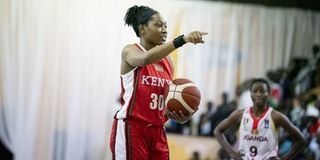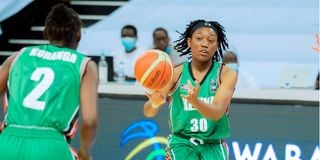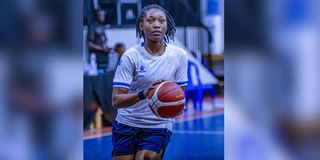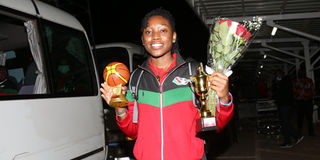Premium
Victoria Reynolds: I let my game speak for itself

Kenya' Victoria Reynolds prepares to take a free-throw during their Fiba Africa Zone Five AfroBasket Women's qualifiers match against Uganda at MTN Arena Lugogo in Kampala on February 14, 2023. Kenya won 61-53.
What you need to know:
- I continuously train no matter where I am. Not just team training, but individual training and weights.
- Contrary to popular belief, I have always been underrated, underestimated and even overlooked.
Victoria Reynolds is one of the top women basketball players in Kenya. She spoke to My Network about her life and career. Excerpts:
You have several nicknames. Tell us about them...
Outside Kenya, I’m known as Vic or Vicky, but in Kenya, I’m called Nyaloka. To my knowledge “Nyaloka” means “someone from the other side.” I was born in the US. My team-mates and coaches in Kenya christened me “Nyaloka” when I arrived in 2021 and it stuck. I don’t mind it.
Why did you ditch soccer, swimming and taekwondo for basketball?
In the States, it’s common for children to specialise in a sport from a young age. For me, it was basketball. One is because it's a controlled climate, and two, there wasn’t the hassle of being wet or waking up extremely early for training. And, there I found it more entertaining to play. However, if I were to choose another sport to play apart from basketball, it would’ve been soccer.
You chose to represent Kenya instead of the US where you were born and raised. Why? Do you regret the switch?
It wasn’t much of a choice. The USA basketball team is extremely hard to make. There are plenty of women who are skilled enough to join the team, but unfortunately, there are only 12 positions available.
So, like many other players who are fortunate to have dual citizenship or who are naturalised, in order to play in the international competition, we look forward to joining our second countries.
You have emerged the Most Valuable Player several times representing both Kenya and the Kenya Ports Authority (KPA) team, including recently at the Zone 5 AWBL. How does it feel to be an MVP? What does it take to get there?

Kenyan national basketball team player Victoria Reynolds in action.
Considering I started playing for the Kenya National Team in 2021, and also occasionally joining KPA for AWBL Qualifiers, being named an MVP along with Best Small Forward at the national team and club level and also best scorer in 2022 AWBL Qualifiers in Dar es Salaam, Tanzania, is an honour.
It’s very rewarding to know that hard-work does pay off and everything is earned on merit. It takes consistency and discipline to achieve such, and I’m proud of myself for setting a standard I hope to continue meeting.
How do you manage to be on top of your game both for country and club?
I continuously train no matter where I am. Not just team training, but individual training and weights.
Winning individual and even team awards comes with celebrity status. How do you handle that fame?
I usually keep to myself, so it’s always a bit funny to me when someone recognises me from Team Kenya, but, I appreciate the attention and use it as fuel to continue being the best I can, inspiring others.

Kenyan national basketball team player Victoria Reynolds in action.
How has basketball shaped you?
I feel it has shaped me to be hard-working and driven. To play basketball is like doing anything else. If you want to be the best you can be, then you have to be dedicated to working hard and achieving your goals.
It’s shaped me to be someone who is never satisfied or content. This drive is something I have both on and off the court. If I’m devoting my time to something, then I will give it my very best each time.
What motivation do you draw from your father, the former Kenyan international basketball player “Big” Ben Wanjara?
Both my mother and father played basketball at the collegiate level. It’s nice that both of us played for the national team and have impactful legacies.
What’s the toughest match you have ever played?
It’s hard to say. The Egyptians are always tough both nationally and at the club level, so it is hard to answer. I’d say playing Egypt, they are not only skilled, but extremely tactical.
Have you seen any benefits of playing for Kenya’s national team?
Playing for Kenya provides many blessings. Most important to me is I’m able to see family at least once or twice a year that I otherwise would not be able to see frequently. I’m also able to travel all over Africa and sometimes outside of Africa. I’ve also made good friends.

Kenya Lionesses player Victoria Reynolds poses with her MVP award after their arrival at the JKIA from Rwanda where they won the the Fiba AfroBasket Zone Five qualifiers on July 18, 2021.
Is basketball your dream career? What else do you do apart from playing basketball?
Yes, it is my dream career. I’m hoping to play in the WNBA [American women professional basketball league]. If not the WNBA, then in the EuroLeague or EuroCup. Once I finish playing, I hope to start training girls and boys who are also interested in playing basketball at the highest level.
Who is your role model in women basketball?
I don’t have a single role model, but, one player I appreciate is Marine Johannes, a guard from the French Nation Team, Lyon French Club and WNBA side New York Liberty. She motivates me because she was drafted as an underdog and showed her worth throughout this past season in WNBA.
What life lesson(s) have you got from basketball?
To enjoy and not take anything for granted.
Are there specific challenges you have encountered in basketball? How did you navigate them?
Contrary to popular belief, I have always been underrated, underestimated and even overlooked. Even now. I take it in stride, though. As a result of this, it makes me work harder each time I feel I have been slighted. I don’t ever act out. I just let my game speak for itself.
You have a Bachelor’s Degree in Architectural Studies from The College of William and Mary. Why did you choose that course? Does it help you?
I’ve always enjoyed drawing and creating. I tried accounting and computer sciences, but those weren’t for me. When I ventured into architecture, I found it a lot more enjoyable. It will help me in the future.
Once I stop playing basketball, I plan to finish my master’s degree in property development and build my own commercial and residential properties.





